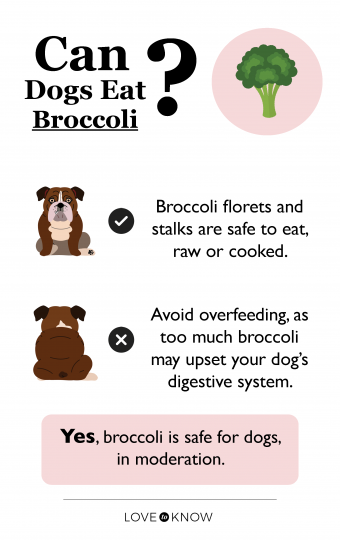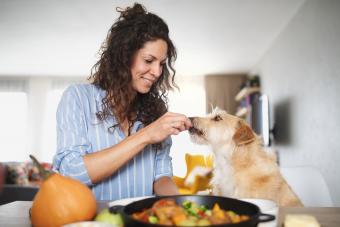
Yes, dogs can eat broccoli, and it's actually quite nutritious. Dogs can consume both cooked and raw broccoli if no seasonings or oils have been added. However, because the florets contain isothiocyanate, this vegetable should always be given in relatively small amounts.

Broccoli is a Safe Addition to Your Dog's Diet
All types of broccoli are safe for dogs to consume. Broccoli's nutrients can improve everything from your dog's eyesight to their nervous system, as well as encourage faster wound healing.
It's high in vitamin K, which is thought to promote bone density in dogs and aid in the development of stronger, healthier bones. This offers a significant advantage for both older dogs and younger, energetic puppies or working breeds to support their more active lifestyle. Broccoli's vitamin C content may also reduce the risk of infections and illnesses in older dogs, and the potassium it provides can improve heart health.
Broccoli is high in fiber, which can help with digestion and weight loss. It's also high in vitamins A, B, C, D, and E, in addition to vitamin K, which may assist in supporting general health. Broccoli also includes lutein, an antioxidant that promotes eye and heart health, as well as other anti-inflammatory antioxidants.

Potential Hazards
Consider the florets and broccoli stalks as two separate elements of the broccoli plant. Cooked or raw in little bits, both are safe to eat. Broccoli florets, on the other hand, contain chemicals known as isothiocyanate, which are found in all cruciferous vegetables, such as cabbage, cauliflower, and kale. Isothiocyanate can cause gastric irritation in your dog.
As a result, it's critical to correctly portion broccoli for your dog. If the florets contain too much isothiocyanate, it might produce nausea, gas, bloating, and diarrhea. If your dog consumes a large amount of broccoli, the stomach disturbances may become severe, resulting in serious health problems or even death, though this is very rare.
Broccoli stalks are quite fibrous, and if given in large portions, they might cause choking. To eliminate this problem, cut them up, or even better, serve them steamed or roasted without any additives.
How to Prepare Broccoli for Dogs
Always consult your veterinarian before giving your dog any new foods, and observe them regularly after giving them a small amount the first time to ensure that their digestive system can handle it.
Isothiocyanate in modest amounts is generally safe, but if a dog consumes more than 10 percent of their calories from broccoli, this could cause gastrointestinal inflammation. The true danger begins when a dog consumes a considerable amount of broccoli, roughly 25 percent of their daily caloric intake.
If you decide to offer broccoli to your dog, begin by rinsing the veggie thoroughly to remove any pesticides or herbicides and debris. Then, slice it up into bite-sized pieces and lightly steam to aid in digestion. Broccoli can be fibrous, so check to see if the bits are soft and simple to eat. Also, only serve it as an occasional treat and in limited quantities.

If you choose to feed your dog raw broccoli, puree it first to make digestion easier. If you don't have access to a food processor or blender, slice it up into small, bite-sized pieces.
Broccoli is a Nutritious Occasional Snack
Yes, broccoli is a healthy vegetable for dogs and is regarded as one of the safest. Just keep in mind to start with small amounts to avoid any stomach or digestion problems. When you're seeking a healthy snack or a nutritious motivational treat for your pup, this cruciferous veggie is a wonderful addition to your dog's occasional treat list.







